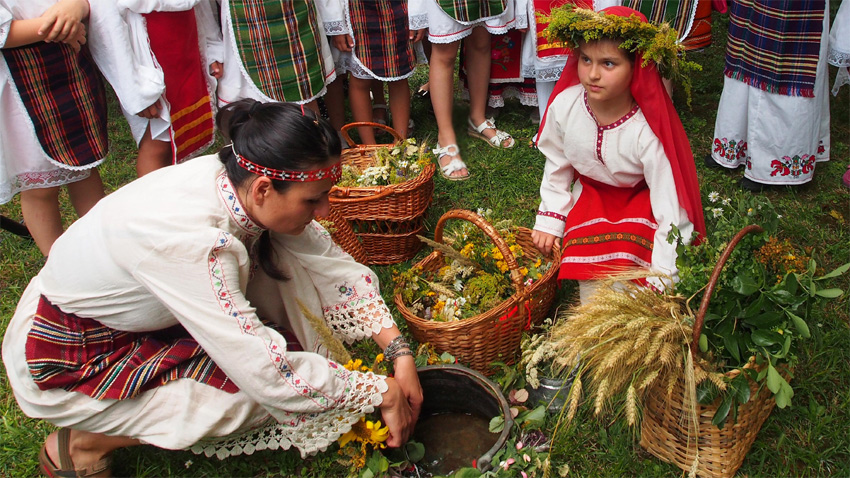According to traditional belief medicinal herbs were born of the eternal battle between good and evil, between God and the Devil.
Legend has it that when God fashioned man out of mud, He left him out in the sun to dry and decided to take a rest. Being very tired, He dozed off. Along came the Devil and rammed God’s creation with his finger repeatedly (in some versions the Devil used an awl). To remedy the damage done, God went out and gathered grass and stoppered each wound with it. He then blessed the grass to turn it into medicinal herbs. But he missed one gash and that is the aperture disease enters the human frame through to do men harm. Again according to folklore legends the curative power of herbs is at its most powerful on Enyovden – 24 June – the day of Ivan Bilyober (herb gatherer), also known as Ivan Letni (summer Ivan). On this day the Christian Orthodox church celebrates the birth of St. John the Baptist. To this day it is a tradition to pick herbs early on Enyovden, before sunup. In olden times the ritual of herb picking was accompanied by special songs. The central personage in these songs is, most often than not, called Enyo or Yanyo, who has “gone out to gather herbs with his cart”.
 The ritual songs often have similar lyrics and a narrow tone range, evidence of their ancient roots. The lyrics were specifically designated for the maidens and the brides who took part in the ritual, to the women of the homes the lasses would pay visits to on this day. In some parts of the country there existed a ritual called Enyova bulya (Enyo’s bride). The lasses would dress a 3-4 year old girl up like a bride. Throughout the day they would carry her lest she touch the ground, for her purity must not be breached or her bond with the celestial forces broken. Carrying the girl they would go to the fields, all water sources and make the rounds of the entire village. The ritual was performed for fertility and also – so that the girls taking part in it would marry well. It ended at the house where a cauldron of “silent water” was left overnight. On the night before the feast day, the girls would put their posies into this water, along with a ring or some other trinket. The ritual tour ended with pre-nuptial divinations. Enyo’s bride would fish out the posies one by one to the sound of incantations by the girls – of shepherds, artisans, teachers, merchants etc. That was how each found out what the occupation of her future husband would be.
The ritual songs often have similar lyrics and a narrow tone range, evidence of their ancient roots. The lyrics were specifically designated for the maidens and the brides who took part in the ritual, to the women of the homes the lasses would pay visits to on this day. In some parts of the country there existed a ritual called Enyova bulya (Enyo’s bride). The lasses would dress a 3-4 year old girl up like a bride. Throughout the day they would carry her lest she touch the ground, for her purity must not be breached or her bond with the celestial forces broken. Carrying the girl they would go to the fields, all water sources and make the rounds of the entire village. The ritual was performed for fertility and also – so that the girls taking part in it would marry well. It ended at the house where a cauldron of “silent water” was left overnight. On the night before the feast day, the girls would put their posies into this water, along with a ring or some other trinket. The ritual tour ended with pre-nuptial divinations. Enyo’s bride would fish out the posies one by one to the sound of incantations by the girls – of shepherds, artisans, teachers, merchants etc. That was how each found out what the occupation of her future husband would be.
English version: Milena Daynovа
Eight days before Easter, we celebrate Lazarus Saturday (St. Lazarus Day). It is the first of the three major Christian feasts associated with the miracle of the Resurrection and is followed by Palm Sunday and Easter. St. Lazarus Day is celebrated..
The Bulgarian village of Turia at the southern foothill of the Balkan Range is welcoming over a thousand participants in the Masquerade Games "Old Men in Turia". This year's edition of the festival on 30 March will feature 28 mummers' groups from all..
"In a vast region in northern Bulgaria, St. Todor is somehow perceived as a demonic character... He visited gatherings of unmarried girls, which were prohibited during that period; he acquired the appearance of a young bachelor, but distinguishable by..
Eight days before Easter, we celebrate Lazarus Saturday (St. Lazarus Day). It is the first of the three major Christian feasts associated with the miracle..

+359 2 9336 661
